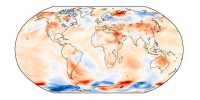Climate change is occurring, and the overwhelming scientific opinion is that rising global temperatures are a direct result of human meddling with the environment, which has been hastened by the reckless use of fossil fuels. Many people, however, refuse to acknowledge this truth, blaming the change on Earth’s “natural cycle” or even denying that anything has changed at all. A new assessment of 88,125 peer-reviewed environmental research shows that the consensus is even stronger than the 97 percent consensus established in 2013: currently, 99.9% of peer-reviewed, published studies believe that people are driving climate change.
The experts believe that this will put an end to all climate denial, which still exists (surprise) among many politicians and the public. The findings reported in the journal Environmental Research Letters. “We are virtually certain that the consensus is well over 99 percent now, and that any meaningful public discussion about the reality of human-caused climate change is pretty much closed,” said Mark Lynas, a visiting fellow at Cornell University’s Alliance for Science and the paper’s first author, in a statement.

While controls over the Earth’s climate system have been subjected to rigorous hypothesis testing since the 1800s, public debate continues to rage over the scientific consensus on the role of human activities in present climate change. By examining the recent literature for studies critical of anthropogenic-caused global warming, we update prior efforts to measure the scientific consensus on climate change. We investigate a randomized sample of 3000 climate-related papers from a collection of 88125 papers published since 2012 when this subject was last addressed thoroughly.
We also employ a second sample-weighted technique that deliberately biased with keywords in order to locate any skeptic peer-reviewed papers in the entire dataset. Out of the subset of 3000 papers, we find four skeptics, as demonstrated by abstracts assessed as implicitly or expressly skeptics of human-caused global warming. We detected 28 papers that were implicitly or expressly sceptical in our sample using pre-identified sceptical keywords. We conclude with high statistical confidence that in peer-reviewed scientific literature, the scientific consensus on human-caused modern climate change (represented as a percentage of total publications) exceeds 99 percent.
At the state, congressional district, metro area, and county levels, these maps show how Americans’ climate change beliefs, risk assessments, and policy support differ. NOTE: The data for the Congressional Districts is from the 116th Congress. Because of recent and continuing redistricting, some of these data (for example, North Carolina) are not up to date at the Congressional District level.
Regrettably, many people still require persuasion. According to Yale Climate Communication, over 72 percent of Americans believe global warming is occurring, with only 57 percent saying it is “mostly caused by human activities.” Even more worrying, 25% of Americans say there is “a lot of dispute” among scientists about whether global warming is happening at all, demonstrating a substantial disconnect between scientific results and public perception.
















